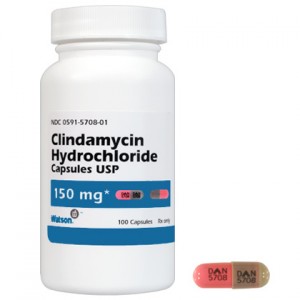Clindamycin Side Effects
Serious Side Effects of Clindamycin
- diarrhea with blood or water in it
- jaundice (yellowed skin or eyes), which may signify liver damage
- dangerously low blood pressure, which can cause fainting
- cardiac arrest (heart stops beating)
- decrease in frequency or amount of urine which could indicate kidney problems
- severe allergic reaction: red or itchy skin, hives, swelling of the mouth, tongue, throat, or face and trouble breathing
Common Side Effects of Clindamycin
- dry, red, itchy or peeling skin
- aching of the joints

- indigestion (heartburn)
- painful swallowing
- yeast infection of the vagina
- vaginal discomfort, swelling or itchiness; abnormal vaginal discharge
- upset stomach or throwing up
- diarrhea
- abnormal tastes in mouth
Warnings & Recalls for Clindamycin
Clindamycin Black Box Warning
Clindamycin may cause
Clostridium difficile associated diarrhea (CDAD) or even colitis caused by an overgrowth in bacteria in the intestines. Contact your doctor
immediately if you have abnormal diarrhea with blood or water in it.
Clindamycin and Pregnancy
Clindamycin has been assigned by the U.S. Food and Drug Administration as a
pregnancy Category B medicine. Clindamycin is
not known to cause harm to the fetus when taken during pregnancy.
Do not breastfeed while taking clindamycin, this medicine can pass through breast-milk and harm a nursing baby. If you are pregnant or planning to become pregnant,
let your doctor know before taking clindamycin.
General Warnings
Patients who are
allergic to ingredients in clindamycin or are taking
erythromycin should not use clindamycin as a treatment for their infection. If you have any of the following conditions,
let your doctor know to be sure that clindamycin is safe for you to use:
- allergies
- any intestinal disorders such as colitis or Crohn's disease
- kidney or liver disease or damage
- any skin disorders or allergies that may affect the skin
- if you are using any other medicines, vitamins, supplements or herbal products
Be sure to keep
all appointments with your doctor so your health may be monitored through blood, kidney and liver function tests. Let all healthcare providers know that you are using clindamycin and if you are to have surgery, let your surgeon know
in advance.
Clindamycin Treatment and Use
Clindamycin | Cleocin is a generic lyncomycin antibiotic medication for treating several types of bacterial infections. Clindamycin has been shown to improve a variety of conditions from acne to malaria. Clindamycin may be prescribed for treating infections of the:
- lungs or respiratory tract
- skin or soft tissue
- blood
- female pelvis or reproductive organs
- bone or joints
Clindamycin can be used to prevent serious heart infection when taken by patients with heart disorders who are undergoing dental work.
How Does Clindamycin Work?
Clindamycin works by preventing bacterial ribosomes from making protein. Without the formation of protein, bacteria cannot reproduce and further infect the body. Clindamycin kills off bacteria that can damage the body without affecting levels of healthy bacteria that the body needs.
How to Take Clindamycin
Clindamycin comes in capsule, oral suspension, and injection form depending on your treatment type. Ask your doctor which medicine is right for you. Do not use more or less than prescribed by your doctor and do not end your use of clindamycin until your treatment cycle is over. This will ensure that the infection is properly treated and reduce the possibility of the infection returning or becoming resistant. Follow all labeled instructions and directions given to you by your doctor.
Clindamycin capsules are usually administered in 150mg to 450mg doses for adults four times a day or once every six hours. Clindamycin injection is typically given in1200 mg or up to 2700 mg each day in 2 to 4 doses. No more than 800mg of clindamycin capsules or 4800 mg of clindamycin injection should be taken in 24 hours.
Clindamycin may also come in gel, foam, lotion, and liquid form for treating acne. Ask your doctor for proper instructions regarding how to use these forms.
Other Names for Clindamycin
Brand name:
- Cleocin
- Cleocin Pediatric
- Cleocin Phosphate
- Cleocin Hcl
Generic name:
Lawsuits & Legal Information for Clindamycin

